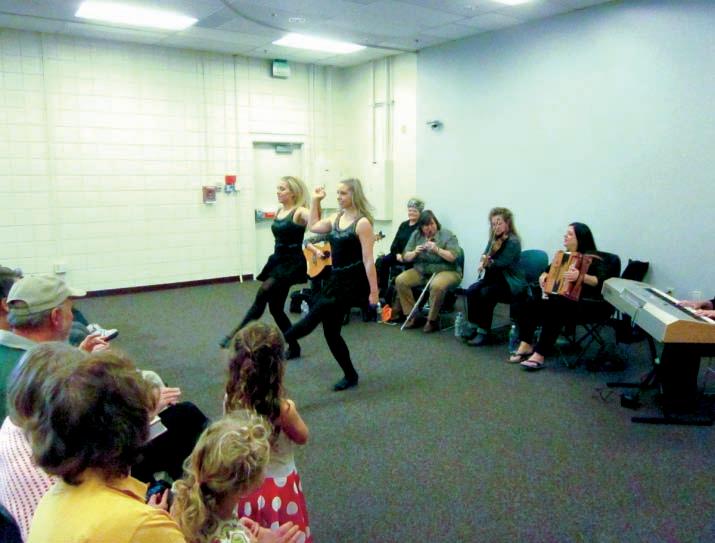
9 minute read
news
from March 13, 2014
Hit group hits Miller
An D.C.-based political organization is trying to cut short the political career of a rising Nevada Democratic figure before he becomes too much of a threat.
Advertisement
The State Government Leadership Foundation has launched a half-million dollar campaign to attack Nevada Secretary of State Ross Miller, who is running for state attorney general. SGLF’s television spot target’s Miller’s alleged lifestyle, using photos of Miller and celebrities that the organization lifted from Miller’s websites. “Fancy parties, exclusive sporting events,” the narrative goes. “Posing with celebrities, even Playmates. Ah, one can dream, but for politician Ross Miller, it’s reality.” This is intended to outrage Nevadans.
Despite its staid name, SGLF has been active for more than a decade in attacking Democrats around the nation. Last year ProPublica used the Freedom of Information Act to obtain SGLF tax documents showing its previously secret finances. It was founded mostly with money from Exxon, Pfizer, Time Warner and other corporations.
Boulder City opts out
On a unanimous vote, the Boulder City Council banned medical marijuana dispensaries from its territory, choosing for the town’s 30 patients with marijuana cards to rely on dispensaries in Henderson or in Clark County territory. BC councilmembers told residents the town, population 15,000, is not set up to handle such an operation. They did not specify what would be burdensome about it, though audience members raised speculative issues. There are already at least five pharmacies in the town.
Boulder City is a former company town, a federal reservation for Hoover Dam workers. In its early days, gambling and liquor were banned, and these practices bled over into self-government after the dam was finished. Liquor did not become legal until 1969. Gambling is still illegal there, though it is available outside city limits.
Meanwhile, the marijuana effort spreads outside Nevada. Seventeen state legislatures are considering outright legalization and regulation, in addition to Colorado and Washington, which already have it. Twelve states are considering decriminalizing, and D.C. has just eliminated jail time for use. That’s in addition to the 16 states— Nevada among them—that have decriminalized it in various ways. Another 14 states are considering enacting medical marijuana laws. Twenty already have, counting Nevada’s halting, 13-year efforts.
Burners ready to govern?
New Yorker magazine: “As 2013 wound to a close and dismal year-end assessments poured in on the performance of the Obama Administration—the N.S.A. surveillance scandal, the botched Obamacare rollout—the president was looking for idea men. His move was to fly in a cadre of brainy Silicon Valley types. But he might have also dropped by Harlem, where a fund-raiser for the Burning Man Project, the nonprofit spinoff of the annual arts festival and bacchanal in the Nevada desert, had taken on a chin-stroking air. “You know what I’m really interested in?” Larry Harvey, the festival’s founder, asked, in his remarks onstage. ‘Governance.’
“Burning Man is no Model U.N., but as a congregation of selfappointed outliers in silly hats, it was a forerunner of the Tea Party and Occupy Wall Street. … [It has an] airport, law enforcement, emergency services, and electrical grid. … Burners [claim they] have helped revitalize downtown Las Vegas and met with members of the Australian government. We’re planning for a hundred years,” Harvey told the crowd. “If we can govern the way we want, then what we’ve all experienced”—at Burning Man—“will be a very common experience. But what wisdom could our government take from Burning Man right now? … When it came to Obamacare, the writer Julia Allison offered a bit of advice: ‘If people took self-reliance [a Burning Man principle] as a central tenet of health, we’d have people taking really good care of themselves. Since I’ve been to Burning Man, I haven’t gotten sick.’ …
“Burning Man doesn’t have all the answers when it comes to social organization. The festival is plagued by the same problems that plague American society.”
It’s starting again
Political use of tax-funded resources has been chronic problem
A state agency has taken sides on the merits of a ballot measure that was placed by on the November ballot by voters’ Dennis Myers signatures. In the first issue of its new newsletter, the Advocate (also the title of the nation’s leading gay publication), the Nevada Business and Industry Department included an item that reads in part: “Passage of this tax will alter the view of businesses looking to relocate to our state, place a financial burden on home-grown businesses and open the door to a spike in unemployment. For these reasons and more, the Department of Business and Industry is joining prominent members and supporters of the business community to encourage you to help defeat this job killing tax.”
Bruce Breslow Department of Business and industry
The reference is to an initiative petition circulated by the Nevada State Education Association. It calls the initiative the Education Tax. The business community calls it the margin tax.
No language from supporters of the tax was included in the item in the newsletter, which also claims that the measure “would create a new bureaucracy” and it provides to readers the website address of one of the groups opposing the tax.
Nevada Revised Statute 281A.520 reads in part that “a public officer or employee shall not request or otherwise cause a governmental entity to incur an expense or make an expenditure to support or oppose: (a) A ballot question. (b) A candidate.”
Bruce Breslow is the director of the department, appointed by Gov. Brian Sandoval. In 2004, as attorney general, Sandoval criticized the conduct of White House “drug czar” John Walters, who refused to file the required campaign disclosure reports after he used federal funds to campaign in Nevada against a ballot measure (“Tax-funded campaigns,” RN&R, Oct. 12 2006).
Breslow said the newsletter should not have emerged in that form.
“They should never take a position on either side on something like that,” Breslow said when contacted. “You’re not supposed to use state funds on a ballot question. This was the first-ever newsletter. So we will not do this again.”
He said the department’s Las Vegas office produced the newsletter, and he didn’t expect the content to take sides on the tax. After checking with his staff, he added, “That was posted in error. Our staff accidentally posted the initial draft.” That version was rewritten to remove the advocacy material, he said. “We posted the wrong version.” That version will now be replaced with the correct version online.
Breslow’s attitude is in contrast with that of some officials who have been accused of using taxfunded facilities or resources for political purposes. He didn’t try to defend it. They did.
State government’s new business newsletter contains a statement opposing a ballot initiative petition.
Equal time?
In 2006, the Committee to Regulate and Control Marijuana (CRCM) sought an injunction against the use of tax-funded resources by Washoe County District Attorney Richard Gammick, Clark County commissioners, the members of the Nevada Board of Regents, and Las Vegas Metropolitan Police Department spokesperson Stan Olsen, all of whom had used official facilities to attack a marijuana initiative petition.
This is an issue that rises chronically in political campaigns, and though state district judges have supported the officials’ use of tax-funded resources, no one has yet taken the issue to the Nevada Supreme Court, the only state appeals court.
Support for the notion that officials can use their official offices in courthouses or other official facilities for political purposes is usually found in interpretation of the statute, not in its actual language.
In 2006, Gammick responded to the CRCM court action by saying, “Yeah, it’s all bullshit. That’s not what the law says.” He was accused of using official space in the courthouse for news conferences to attack the ballot measure instead of obtaining space outside. He contended that the statutory restriction applies only to the use of public funds for political advertising.
The complaint against the officials read in part, “Mr. Gammick’s conduct is the latest in a mounting effort by certain public officials who oppose Question 7 to push their private views and agendas … all at the expense of the integrity of their respective offices. … As long as these officials believe they can interfere with Nevada’s legislative process, they will continue to do so.”
Subsequently, District Judge David Wall avoided the issue of tax-funded campaigning, instead
ruling on a freedom of speech issue, saying Gammick and the others had a right to speak on issues affecting their official functions. The head of CRCM pointed out that Wall had ducked the issue of campaigning on “public time and the taxpayer dime,” but because Wall had waited to rule within days of the election, the case was never taken to the Nevada Supreme Court.
That same year, the Washoe Regional Transportation Commission posted material on its tax-funded website on a ballot measure dealing with eminent domain and sought to get around the law by including material on both sides of the issue. But that raised the issue of whether the commission could have the role of selecting the material posted, posting strong arguments for its own side and weak ones for the other side. Moreover, the statute does not distinguish between one-side and two-sided material. It bars tax-funded efforts “to support or oppose.”
Since then the statute has been revised and moved to a different chapter (“Chapter 281A - Ethics in government”) of the statutes, but the language remains essentially the same. The statute provides two exceptions, but neither covers political campaigning.
Breslow said that even before the dispute over the newsletter arose, he was checking to see if it would be permissible to have a forum at a state-sponsored conference in September at which both sides would be represented. One of the exceptions in the law is for a television forum at which both sides are represented.
“It’s going to be one of the hot topics of the year and we’d like to have a break-out session on it,” he said. But whatever the legal opinions on that issue are, he said, there will be no more advocacy by his department.
“I’ll take steps to make sure it doesn’t happen in the future.” Ω
Nevada statute
Ladies’ night
Deirdre Robinette and Caitlin Golding dance, with Cherish the Ladies backing them up. Seventy people were in the audience for the Cherish concert in the Sparks Library conference room.













